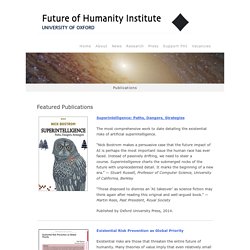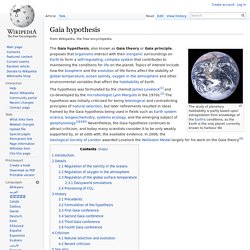

Future of Humanity Institute. This book explores how to reason when you suspect that your evidence is biased by observation selection effects.

We will be discussing many interesting applications: philosophical thought experiments and paradoxes aside, we will use our results to address several juicy bits of contemporary science: cosmology (how many universes are there?) , evolution theory (how improbable was the evolution of intelligent life on our planet?) Urban Innovation. Gaia hypothesis. The study of planetary habitability is partly based upon extrapolation from knowledge of the Earth's conditions, as the Earth is the only planet currently known to harbour life The Gaia hypothesis, also known as Gaia theory or Gaia principle, proposes that organisms interact with their inorganic surroundings on Earth to form a self-regulating, complex system that contributes to maintaining the conditions for life on the planet.

Topics of interest include how the biosphere and the evolution of life forms affect the stability of global temperature, ocean salinity, oxygen in the atmosphere and other environmental variables that affect the habitability of Earth. Introduction[edit] Less accepted versions of the hypothesis claim that changes in the biosphere are brought about through the coordination of living organisms and maintain those conditions through homeostasis.
Environment Everything.
Compassionate Consumerism. Maria Rodale: Eat Trash, Save the Planet. By guest blogger Jeremy Seifert After four years of nonprofit work, Jeremy recently cofounded the production company Compeller, focusing on documentaries that tell stories from the heart and seek to reconnect us to each other and the Earth, while inspiring real change in society. Dive!